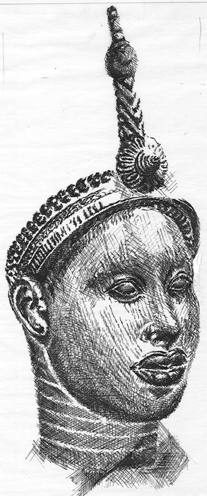I. OLORUN.

Olorun is the sky-god of the Yorubas, that is, he is the deified firmament, or personal sky, just as Nyankupon is to the Tshis, Nyonmo to the Gas, and Mawu to the Ewes. As was mentioned in the last volume, the general bias of the negro mind has been in favour of selecting the firmament for the chief Nature god, instead of the Sun, Moon, or Earth; and in this respect the natives resemble the Aryan Hindus, Greeks, and Romans, with whom Dyaus pitar, Zeus, and Jupiter equally represented the firmament.
Nyankupon and Nyonmo thunder and lighten as well as pour out rain, but Olorun, like the Ewe Mawu, does not wield the thunderbolt, which has become the function of a special thunder-god, and he consequently has suffered some reduction in importance. The name Olorun means "Owner of the Sky" (oni, one who possesses, orun, sky, firmament, cloud9), and the sky is believed to be a solid body, curving over the earth so as to cover it with a vaulted roof.
Like Nyankupon, Nyonmo, and Mawu, Olorun is considered too distant, or too indifferent, to interfere in the affairs of the world. The natives say that he enjoys a life of complete idleness and repose, a blissful condition according to their ideas, and passes his time dozing or sleeping. Since he is too lazy or too indifferent to exercise any control over earthly affairs, man on his side does not waste time in endeavouring to propitiate him, but reserves his worship and sacrifice for more active agents. Hence Olorun has no priests, symbols, images, or temples, and though, in times of calamity, or affliction, when the other gods have turned a deaf ear to his supplications, a native will, perhaps, as a last resource, invoke Olorun, such occasions are rare, and as a general rule the god is not worshipped or appealed to. The name Olorun, however, occurs in one or two set phrases or sentences, which appear to show that at one time greater regard was paid to him. For instance, the proper reply to the morning salutation, "Have you risen well?" is O yin Olorun, "Thanks to Olorun;" and the phrase "May Olorun protect you" is sometimes heard as an evening salutation. The former seems to mean that thanks are due to the sky for letting the sun enter it; and the latter to be an invocation of the firmament, the roof of the world, to remain above and protect the earth during the night. Sometimes natives will raise their hands and cry, "Olorun, Olorun!" just as we say, "Heaven forbid!" and with an equal absence of literal meaning.
Olorun has the following epithets:-
|
(1) Oga-ogo (Oga, distinguished or brave person; ogo, wonder,
praise).
(2) Olowo (ni-owo) "Venerable one."
(3) Eleda (da, to cease from raining), "He who controls the rain."
Elemi, "a living man," literally "he who possesses breath." It
is a title applied to a servant or slave, because his master's
breath is at his mercy; and it is in this sense also that it is used to Olorun, because, if he were evilly, disposed, he could let fall the solid firmament and crush the world.
(5) Olodumaye or Olodumare. The derivation of this epithet is obscure, but it probably means "Replenisher of brooks" (Olodo, possessing brooks). We find the same termination in Oshumaye or Oshumare, Rainbow, and in Osamaye or Osamare, Water Lily, and it is perhaps compounded of omi, water, and aye, a state of being.alive.
|
It may be mentioned that, just as the missionaries have caused Nyankupon, Nyonmo, and Mawu to be confused with the Jehovah of the Christians, by translating these names as "God," so have they done with Olorun, whom they consider to be a survival from a primitive revelation, made to ail mankind, in the childhood of the world. But Olorun is merely a nature-god, the personally divine sky, and he only controls phenomena connected in the native mind with the roof of the world. He is not in any sensé an omnipotent being. This is well exemplified by the proverb which says, "A man cannot cause rain to fall, and Olorun cannot give you a child," which means that, just as a man cannot perform the functions of Olorun and cause rain to fall, so Olorun cannot form a child in the womb, that being the function of the god Obatala, whom we shall next describe. In fact, each god, Olorun included, has, as it were, his own duties; and while he is perfectly independent in his own domain, he cannot trespass upon the rights of others.
Binason Avekes, quoted from Yoruba speaking peoples of the slaves coast of West Africa, by A. B. Ellis

Copyright, Blaise APLOGAN, 2010,© Bienvenu sur Babilown
Toute republication de cet article doit en mentionner et l’origine et l’auteur sous peine d’infraction

Dans les arguments à opposer au hold-up électoral de M. Yayi et de sa clique de fossoyeurs de la démocratie, il faut qu'on soit clair et logique. Une élection a eu lieu dans des conditions rocambolesques. Le pouvoir prétend l'avoir gagnée avec 53 % des voix et 36 % pour son adversaire immédiat.




Les commentaires récents